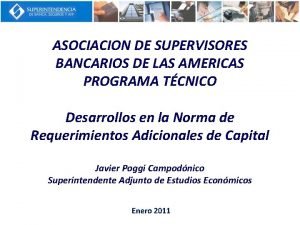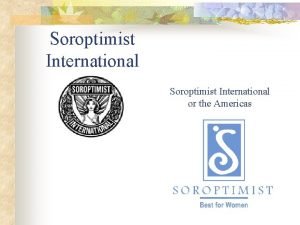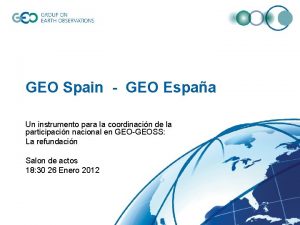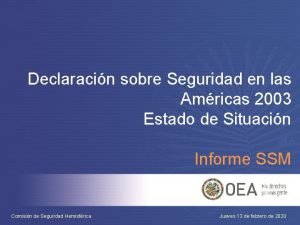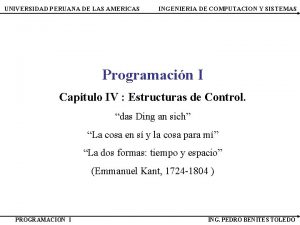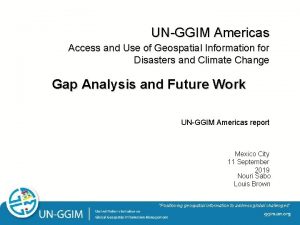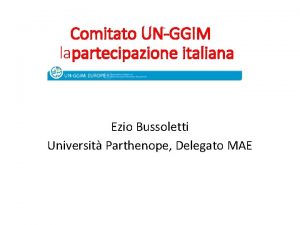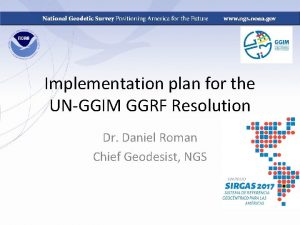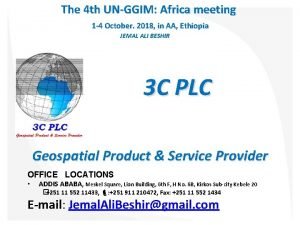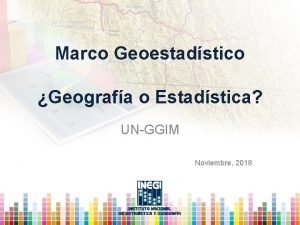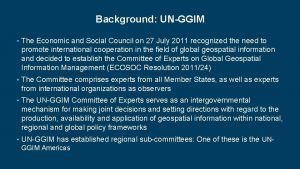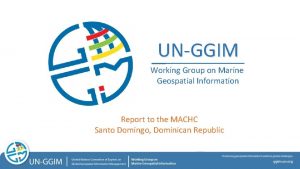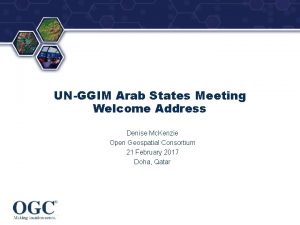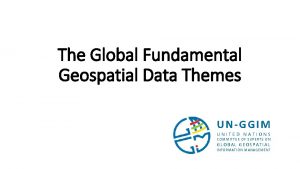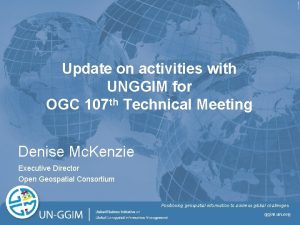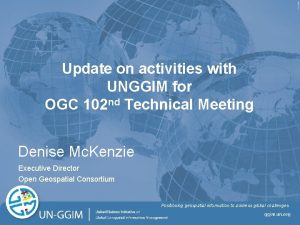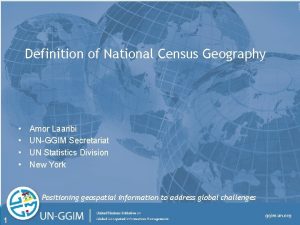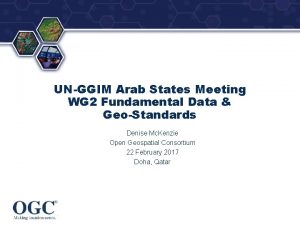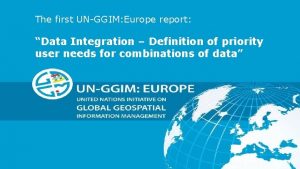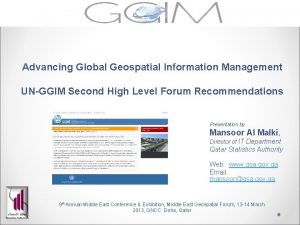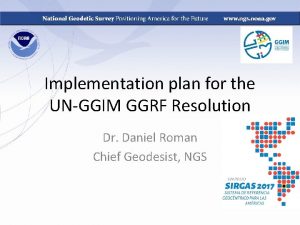UNGGIM Americas Fourth Session UNGGIM Americas 2 0
























- Slides: 24

UN-GGIM: Americas, Fourth Session “UN-GGIM: Americas 2. 0, what are the Next Steps ? ” Cecille Blake United Nations, DESA/UNSD, UN-GGIM Secretariat Santiago, Chile, 5 April 2017

OUTLINE • • The UN-GGIM Agenda – 2. 0 The Global Agenda Decisions contributing to the UN-GGIM global agenda The UN-GGIM Strategy and 2017 Session Agenda – Major work items – New agenda items • UN-GGIM Regional Committees • What is next ? Positioning geospatial information to address global challenges ggim. un. org

Global Development Agenda Positioning geospatial information to address global challenges ggim. un. org

Global Development Agenda Positioning geospatial information to address global challenges ggim. un. org

The next 5 years: UN-GGIM 2. 0 Positioning geospatial information to address global challenges ggim. un. org

UN-GGIM 2. 0, Next Steps 1. Maturity: Moving from “GGIM 1. 0 to GGIM 2. 0” – determining our value proposition to ECOSOC in the next 2 -3 year horizon. 2. Strategy and roadmap on the ECOSOC resolution and how we implement the new and strengthened mandate. • A new strategic plan for UN-GGIM that considers 2020 and beyond in 5 year time steps. 3. Raising more awareness, including political, of UN-GGIM and connecting the political - technical levels within Member States. 4. Connecting more to the activities of the regional committees, commissions, and statistical bodies. 5. Ensuring effective coordination and linkages across Expert & Working Groups. 6. Extra-budgetary and funding options, including ways of implementation. 7. More capacity development for countries in next 5 years – developing guides, standards, methods and norms. Positioning geospatial information to address global challenges ggim. un. org

The UN-GGIM Agenda – 2. 0 ? Inventory of Issues, August 2012 Future trends ECOSOC Resolution July 2016 Decisions 6 th Session UN-GGIM August 2016 Expanded Bureau Meeting December 2016 Positioning geospatial information to address global challenges ggim. un. org

Inventory of Issues 1. A strategic framework for GI 2. Establishing institutional arrangements and legal and common frameworks 3. Building capability and capacity 4. Assuring quality of GI 5. Promoting data sharing, accessibility and dissemination 6. Embracing trends in information technology 7. Promoting geospatial advocacy and awareness 8. Working in partnership with civil society and the private sector 9. Linking GI to statistics Future Trends Five broad themes 1. Trends in technology and future direction of data creation and management 2. Legal and policy developments 3. Skills requirements and training mechanisms 4. Role of the private and non government sectors 5. Future role of governments in data provision and management Positioning geospatial information to address global challenges ggim. un. org

ECOSOC Resolution 2016/27 Strengthening institutional arrangements on GIM • Continue to contribute more to the work of the United Nations. • Renamed ECOSOC’s agenda item from “Cartography” to “Geospatial Information”. • Encouraged Member States to mobilize additional funds and resources. • Encouraged support to cover MS participation. • Requested that UN Regional Commissions provide support to UN-GGIM regional bodies. • Acknowledges the importance of capacity building. • It explicitly recognizes the relevance of geospatial information for the various United Nations policy agendas. • Addresses the issue of sustainable funding, and anchors the Committee in the regular UN conference calendar. • ECOSOC requested that UN-GGIM report in 5 years on the implementation of the resolution http: //ggim. un. org/Programme%20 Review. html Positioning geospatial information to address global challenges ggim. un. org

Decisions, 6 th Session UN-GGIM, August 2016 Decision 6/101: Contribution of regional committees and thematic groups to the global geospatial information agenda • recognized that more needs to be done in order to increase and strengthen capacity development and regional cooperation in GIM • agreed to the establishment of the Academic Network and the Private Sector Network. Decision 6/102: Global geodetic reference frame • Endorsed the road map for the global geodetic reference frame as a principlebased briefing document for national governments • requested that the Sub-Committee continues its outreach and communication, particularly with appropriate regional initiatives and activities • urged Member States to translate the roadmap into their own languages and submit them to the Secretariat to be posted on the UN-GGIM website. Decision 6/104: Trends in national institutional arrangements in geospatial information management • Working Group is encouraged to continue its work in close consultation with the global geospatial community and, in order to give the work greater focus, Positioning geospatial information to address global challenges ggim. un. org

Decisions, 6 th Session UN-GGIM, August 2016 Decision 6/103: Determination of global fundamental geospatial data themes • Member States and regional committees to continue to interact with the Working Group on their work on determining fundamental geospatial data themes • Encouraged Member States to continue to contribute to the global Second Administrative Level Boundary (SALB) data project. Decision 6/105: Legal and policy frameworks, including issues related to authoritative data • It is essential for any legal and policy frameworks that can impact on GI be developed in partnership with the geospatial community, the legal community, and other related areas of the Committee. Decision 6/106: Implementation and adoption of standards for the global geospatial information community • Member States to review their standards and interoperability requirements in regards to the sustainable development goals and consider how they can participate. Positioning geospatial information to address global challenges ggim. un. org

Decisions, 6 th Session UN-GGIM, August 2016 Decision 6/107: Integration of geospatial, statistical and other information The EG focus on consolidation and implementation of the Global Statistical Geospatial Framework; encouraged to focus on capability building; knowledge management; sharing of good practices, e. g. use of technological tools; encouraged to build on the work by other bodies at the global and regional level and enable them to do vice versa. Decision 6/108: Application of geospatial information related to land administration and management • and encouraged MS and the regional committees to participate in the development of the EG action plan and other activities. Decision 6/109: Activities related to sustainable development and the 2030 Agenda for Sustainable Development • Encouraged regional committees and MS to embark on similar initiatives (as UN-GGIM Europe WG on Data Integration) and national and inter-regional exchanges and cooperation, including with the statistical community towards better integration of processes for measuring and monitoring relevant SDG indicators. , Positioning geospatial information to address global challenges ggim. un. org

Decisions, 6 th Session UN-GGIM, August 2016 Decision 6/110: Geospatial information and services for disasters • Recognised that, at an appropriate time, robust plans for capacity building and resource mobilization is necessary to assist developing countries and SIDS in ensuring the availability and accessibility of adequate, reliable and standardsbased GI across all phases of disaster risk reduction and management. • Member States are urged to examine and adopt geospatial data, technology and standards processes being implemented within the Arctic Spatial Data Infrastructure initiative. Decision 6/111: Knowledge base for geospatial information management • Requested the Secretariat to continue supporting, maintaining and improving the knowledge base portal in close cooperation with the secretariats of the regional committees and the international organizations concerned. Positioning geospatial information to address global challenges ggim. un. org

Expanded Bureau Meeting December 2016 Regional committees and Member States were encouraged to: • ensure coherence and integration of agendas among their WGs and how they tie back to the global activities. Connectivity and cross-regional relationships are encouraged among regional committees • engage United Nations Regional Commissions as well as relevant continental, regional or sub-regional political structures in pursuing their work agenda. • Have closer cooperation with the GGRF. , as most of their work plans included work items on Geodesy. • Use ECOSOC Resolution E/RES/2016/27 to ask for better and improved coordination of geospatial information activities within the UN system. • To actively and appropriately represent the Committee of Experts. • be more assertive in advocacy and messaging, and communications must be consistent and continual at all levels • to provide in-kind contributions through sabbaticals, secondments, fellowships Positioning geospatial information to address global challenges ggim. un. org

Implementation Question Following discussions on capacity development the question asked of the Bureau was “Does UN-GGIM carry out implementation, considering that it is a peak inter-governmental mechanism primarily concerned with global policy and strategy? ” Decision It was agreed that UN-GGIM as the peak inter-governmental mechanism should primarily concern itself with global policy and strategy, global norm setting, concepts and frameworks and global principles and standards. Implementation can be a very local matter and hence more feasible via Regional Committees “Plans of Action” that can take global outcomes down to regional, sub-regional and local levels. Positioning geospatial information to address global challenges ggim. un. org

The UN-GGIM Strategic Framework • UN-GGIM Strategic Framework is to be a “living document” • UN-GGIM expert groups and working groups were encouraged to align their work programmes with the UNGGIM Strategic Framework on its finalization Positioning geospatial information to address global challenges ggim. un. org

UN-GGIM: The 2017 Agenda 1. 2. 3. 4. 5. 6. 7. 8. 9. 1. 2. 3. 4. A global geodetic reference framework, Adoption and implementation of standards Determining global fundamental data sets Geospatial information supporting Sustainable Development and the post 2015 development agenda Identification of trends in national institutional arrangements in geospatial information management Integrating geospatial, statistics and other data Legal and policy frameworks Land Administration and Management Disaster risk reduction and resiliency New Work Items Strengthening geospatial information management (Bureau) Marine geospatial information (USA NOAA) National geospatial data and information systems (World Bank) Strengthening collaboration with the UN Group of Experts on Geographical Names (UNGEGN)

How is the UN-GGIM Agenda Accomplished The priorities and work programmes of the Committee of Experts are driven by Member States Private Sector & Academia Consultants Expert and Working Groups The Secretariat Member States Regional Committees

Expert and Working Groups Expert Groups 1. United Nations Expert Group on the Integration of Statistical and Geospatial Information 2. The United Nations Expert Group on Land Administration and Management (UN-EG-LAM) Working Groups 1. Working Group on Global Geodetic Reference Frame 2. Working Group on Development of a Statement of Shared Principles for the Management of Geospatial Information 3. Working Group on Trends in National Institutional Arrangements in Geospatial Information Management 4. Working Group on Geospatial Information and Services for Disasters (WGDisasters) 5. IAEG-SDGs Working Group on Geospatial Information

UN-GGIM: Integration of regions A Regional Architecture UN-GGIM Regional Committees: • Asia-Pacific • Americas • Europe • Africa • Arab States UN-GGIM International Networks: • JBGIS, Academic Network, Private Sector Network Positioning geospatial information to address global challenges

UN-GGIM – Regional Committees Working Groups UN-GGIMAsia-Pacific (2012) UN-GGIM: Americas (2013) UN-GGIM: Europe (2014) WG 1 Geodetic Reference Frame WG 1 Integration of Statistical and Geospatial Information WG 1 Core Data WG 2 Disaster Risk Management WG 2 Access & Use of GI in Disaster Risk Reduction and Climate Change WG 2 Data Integration WG 3 Regional SDI WG 3 Promotion and Assessment of SDI WG 4 Cadastre and Land Management WG 4 Standards and Technical Specifications UN-GGIM: Arab States (2014) UN-GGIM: Africa (2015) WG 1 Institutional Arrangements, Legal and Policy Issues; Awareness and Capacity Building WG 1 African Geodetic Reference Frame WG 2 Fundamental Data and Geo-Standards WG 2 Fundamental Datasets WG 3 Geodetic Reference Frame WG 3 Institutional Arrangements and Legal Frameworks WG 4 Integration of Geospatial & Statistical Information WG 4 Capacity and Capability Development WG 5 Regional Coordination and Cooperation 16 3 – Capacity development 3 - Statistics and Geospatial 2 -Institutional arrangements 3 - Core Data 2 - SDI’s 2 - Disasters 3 - Geodetic 1 - Land 2 - Standards

UN-GGIM Americas • • • CHALLENGES Many agenda items –can you contribute Does the global agenda match your needs How do I move from global – regional to national Elections and leadership changes Shrinking budgets Advocacy the value of GI & communication • • SOME STRENGTHS Member States/20% of global membership Unique governance structure Strong leadership On going capacity building project Treasure chest of best practices & professionals History of cooperation – Geo. Sur, PAIGH, SIRGAS Continuous stock taking and evaluation No guide book of rules

UN-GGIM Americas, What’s next ? At its 4 th Meeting Members agreed that: • It will not be operations as usual? • Its work will be aligned to the global agenda with focus on: – The integration of statistics and geography – Supporting implementation and monitoring for the 2030 agenda and SDGs – GI for disaster risk reduction and management • Employ measures to have the SDI development and management aligned to national policies • Strengthened advocacy and communication, example liaison officers, ambassadors, special thematic advisors? • Improve relations and communication between Ministries of Foreign affairs/Missions and National Geospatial agencies. • Strengthened capacity development initiatives are needed

UN-GGIM Secretariat United Nations New York http: //ggim. un. org/default. html @UNGGIM
 Americas guardians mc
Americas guardians mc Spanish colonization of the americas
Spanish colonization of the americas Geonetcast americas
Geonetcast americas International gateway of the americas
International gateway of the americas Aztec farming
Aztec farming State building in the americas
State building in the americas Abl americas
Abl americas Chapter 24 the americas and oceania
Chapter 24 the americas and oceania The colonial class system
The colonial class system Americas game
Americas game Itf internet
Itf internet Asociación de supervisores bancarios de las américas
Asociación de supervisores bancarios de las américas Open door policy cartoon
Open door policy cartoon Centro de convenciones las americas
Centro de convenciones las americas Soroptimist international of the americas
Soroptimist international of the americas Aemet las americas
Aemet las americas Risk minds international
Risk minds international Americas global position
Americas global position Worlds apart the americas and oceania
Worlds apart the americas and oceania Chapter 24 new worlds the americas and oceania
Chapter 24 new worlds the americas and oceania Declaración sobre seguridad en las américas 2003
Declaración sobre seguridad en las américas 2003 Hteamericas
Hteamericas Americas open door policy
Americas open door policy Rochem americas
Rochem americas Universidad peruana de las americas
Universidad peruana de las americas











